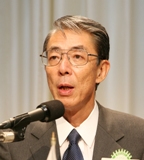��Japanese Agriculture and the Situation Surrounding Agricultural Co-operative Organizations and their Future Direction��
September 17, 2008
Mr. Ichio Kato,
Senior Managing Director of National Federation of Agricultural Co-operative Association
 1. How to Respond to the Changing Times
1. How to Respond to the Changing Times
Deregulation has promoted free competition, and an age has come where joint stock companies are able to enter the agricultural market. Times of strong regulations gave birth to the weak, but it is said that times of deregulation will give birth to the losers. We need to have a sense of fear that the JA Group could become a loser and disappear from Japan.
Japan��s food self-sufficiency rate declined from 73% in 1965 to 40% in 2007. There are some calculations saying that if the current tariffs were to be eliminated, the sufficiency rate would further drop to 12%.
We have built a business model in which US corn, the cheapest in the world, is imported and processed and the products of such processing are supplied to Japanese livestock farmers. We want to examine ways of making possible substitution of corn with rice, so that livestock farmers and rice farmers can become mutually viable.
2. The Tidal Flow of Time has Changed
Today, amidst globalization and the global population increase there is a battle over food supply. Soaring grain market prices and soaring prices of crude oil and fertilizer materials due to resource nationalism are taking place. With Japanese economic power declining, will there be sufficient funds to buy food from foreign countries? This is a point that we need to reconsider.
There are doubts about reliance on market principles. An overemphasis on a profit first mentality and relying on market mechanisms has resulted in a lack of corporate social responsibility (CSR). Moreover, the communal aspect of Japanese corporations is rapidly waning. We feel that the time has come for us to thoroughly review the Japanese agricultural business, agricultural villages, and food.
3. To Gain a Better Understanding of Agriculture
Our association wishes to build a secure bridge between consumers and producers. We also want to be a bridge between generations.
In today��s dietary habits, ��what is sweet and tender�� has become one concept of values, but dentists warn of the fragility of children��s teeth. The traditional roots of Japanese dietary habits were, ��bitterness, astringency (a sense of the seasons and natural tastes)�� and chewing hard foods.
The value of food mileage in Japan is the highest. We want the consumers to know that eating Japanese-grown asparagus leads to energy savings.
4. The Future Direction of Agricultural Organizations
Several years ago, agricultural, medical, and educational services were said to be controlled by the authorities. In our minds, if they are the same authority controlled services, then the issues they face should be the same. So, we thought of the feasibility of collaboration, and examined the issues.
The disparities between large city hospitals and local hospitals are growing. The physicians are aging, and the situation is the same in agriculture. In education, with the privatization of national universities, the performance appraisals by the Ministry of Education, Science, Sports and Technology have been strengthened. This is a crisis for agricultural senior high schools and agricultural faculties. Ample consignment fees are available for engineering- related fields, but such is not the case in agricultural areas of study.
We thought of how we can share these problems. The keywords are, ��revitalization of the local areas��, ��aging society��, and ��medicine and one's daily food are equally important in making a sick body well��.
We want to reflect on and improve the JA Group��s tendency of taking things on within the group and their across-the-board way of doing business.
Estimated agricultural production value has fallen below \9 trillion. Food industry sales are said to be \80 or \90 trillion. We need to concentrate on increasing agricultural production value. It will be necessary to engage in joint work between JA groups all across the country and other industries, and capital participations may be needed. In the past, trading companies were the JA Group��s competitors, but we need to recognize that if the local villages require it, we need to form alliances with those trading companies.
Agricultural production companies in Ibaragi Prefecture have introduced the manufacturing methods used in automobile companies into their agricultural production sites, leading to a 30% improvement in production.
JA is undertaking an ��ecological study of rice paddies�� in 42 production locations in 15 prefectures. There are myriads of living organisms in rice paddies. The study is about the effects of the use of chemical fertilizers on the paddies�� ecosystems. The study is a trial to scientifically prove the impact of agricultural chemicals. It will be used as data for the country's bio-diversity strategy, and will be important data in thinking about the future of agriculture.